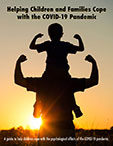Social and Emotional Health
Even during these challenging times, we can still provide children the support and stability they need tomake them feel loved, safe and secure.
ALL caregivers including directors and teachers can help support a child's healthy development while taking care of themselves. Just a few minutes of your time and attention can make a difference. Here are some developmental tips that can support overall mental well-being as well as social and emotional development while fostering resilience.
Nurturing Relationships
- TIP #1
- TIP #2
- TIP #3
- TIP #4
- TIP #5
Tip 1
You can support a child's social and emotional development by creating and maintaining a routine because it gives children a sense of predictability and reassurance, this helps them feel safe. Refer to the COVID-19 Parenting: Structure Up Tip Sheet for more details.
Keep Your Schedules Fresh by Child Mind Institute
Tip 2
Don't shy away from difficult questions and conversations like "What is COVID-19?" and "Why can't I play with my friends?". This is the opportunity to explain to people of all ages that physical distance does not mean social isolation and think together about some new ways they can communicate with loved ones, routine phone calls, virtual meetings, letters, etc. For more difficult topics, we encourage you to use social stories that have age appropriate language and are fun to read and re-enact. Refer to Screen Sense: Five Tips to Make the Most of Video Chats for more details.
Limit News by Child Mind Institute
Tip 3
Validate feelings to encourage your child to express their emotions. If their emotions language is limited, get creative by use puppets/dolls/drawings/books to facilitate the communication. Play helps your child grow emotionally becauseit provides a joyful outlet for anxiety and stress. Being attuned to people's emotions is both instinctual and takes practice, just remember that having listening ears and staying calm can help you be more empathetic and nurturing.
How to Soothe an Anxious Child During The Coronavirus Pandemic by Child Mind Institute
Tip 4
Times are stressful for everyone so practice relaxation exercises together like dancing, singing, animal yoga, blowing bubbles, and the classic deep breathing. Visit Cosmic Kids, for more ideas on yoga and breathing exercise for kids. Here are a few resources.
S.T.A.R. Breathing Tool by Conscious Discipline
Drain, Conscious Discipline by LOGOS ACADEMY
Tip 5
Create a "quiet" place in your home where yourchild can calm down, recreate a cozy corner like the one they have in school.
Positive Time Out (Jared's Cool Out Space) by Positive Discipline
Parenting in Stressful Times
Just because you and/or children are overwhelmed and stressed by change, it does not mean that you do not discipline behaviors you would like to discourage, eliminate, or reduce. Here are our recommendations for parenting in times of stress.
- TIP #1
- TIP #2
- TIP #3
- TIP #4
- TIP #5
- TIP #6
- TIP #7
Tip 1
Your self-care is important at this time. Find small amounts of time for activities you enjoy this model's good self-care habits, and this helps you be more available to those you love. Refer to the COVID-19 Parenting: Keep Calm and Manage Stress Tip Sheet for more details. Here are a few apps that can help you in your mindfulness journey resources.
Tip 2
Focus on quality not quantity. High quality brief moments with your child are highly valuable. Remember that quality moments look different for everyone.
Staying Calm by Child Mind Institute
Tip 3
Make time to play and relax. Offer verbal and physical reassurance, comfort, and patience as often as you can.
How to Help Kids With Imaginative Play During The Coronavirus Pandemic
Stay Active | Coronavirus Daily Tips by the Child Mind Institute
Tip 4
Use positive discipline strategies. It is normal for children's behaviors to change during difficult situations or transitions. This may include more challenging behaviors like tantrums and hitting or more subtle behaviors like withdrawing and seeking attention. Look for patterns in those behaviors like when they occur to help you understand why they occurred. Refer to the COVID-19 Parenting: Bad Behavior Tip Sheet for more details.
Parenting Tips - What is Positive Discipline? by Parents
Parenting Tips - How to Discipline Children by Parents
Tip 5
Praise a child when they are displaying positive behaviors like sharing, gentle hands, kind words, etc. Refer to the COVID-19 Parenting: Keep It Positive Tip Sheet for more details.
Flexibility Is Key by Child Mind Institute
Tip 6
Write expectations and put them in a place where all family members can easily see them, including children. Use simple visuals or pictures for each rule. These should tell children what they should do, NOT what they shouldn't do, social stories are perfect for this.
The Social Distancing Story
Below you will find The Social Distancing Story in English, Spanish, and Creole.
Tip 7
Reminding children frequently of your expectations and rules is normal. Be flexible, offer them choices whenever possible to create opportunities for self-efficacy and accomplishment. Use simple behavior charts like My Healthy Week or videos like the one below to encourage good habits.
How to Wash Your Hands by Sesame Street In Communities

If you know of any parent that may benefit from tips for how to improve their relationship with their child and improve their child's behavior please refer to Pocket PCIT Online at the University of Miami. All services are free and offered online. Start your free access now!
For additional information about how to help children and families cope with the psychological effects of the COVID-19 pandemic please refer to Helping Children and Families Cope with the COVID-19 Pandemic, a resiliency-enhancing activity book developed by Dr. Annette La Greca and Scott Sevin, President of 7-Dippity.








